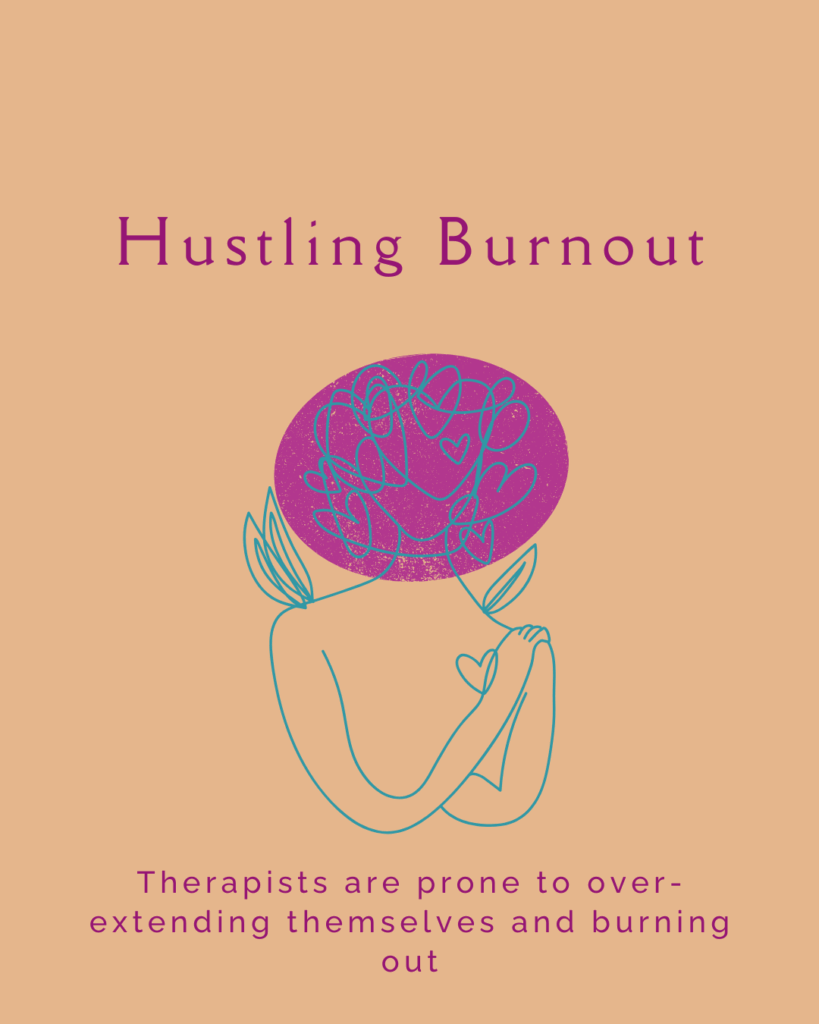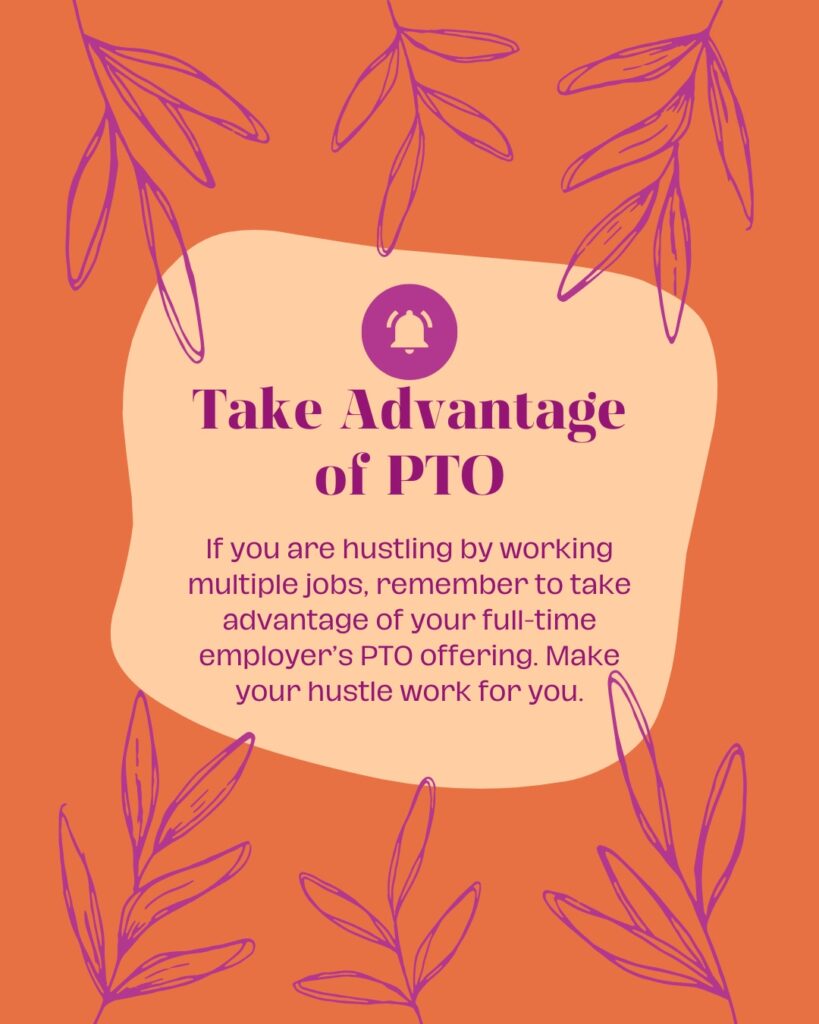Every therapist I’ve met has either done the hustle of working multiple jobs or knows someone who has. “Hustling Burnout” is an effect of expectations to always do more for your clients, earn more, and accumulate certifications.

Why Are So Many Therapists Hustling?
Hustling by working full-time positions and part-time in private therapy practices enables social workers to seek higher-level or non-clinical jobs while still engaging in clinical services. This allows therapists to better meet their financial needs and support their families. It also offers social workers and therapists opportunities in different aspects of the mental health field at the same time, which can be personally and professionally rewarding.
Many social workers entered the field because we care deeply about providing quality services to under-resourced communities. We paid a lot of money on Master’s programs, specialized training, and continuing education to remain at the forefront of our fields. The truth of the matter is that nonprofits, which offer the most opportunity for direct service in under-resourced communities, do not pay social workers and therapists well. This is generally at no fault of their own and another effect of systemic disenfranchisement and devaluation of social services.
The hustle of working multiple jobs is fulfilling. I hear from therapists how meaningful it is to be able to support a spectrum of symptom presentations and diverse populations while diversifying their income and growing careers in different realms.
Common Causes of Hustling Burnout
It is exhausting for anyone to work multiple jobs, no matter the field or how rewarding the work is. Spending additional hours at work takes time that others might spend engaging in self care activities with their families, friends, pets, or solo. As rewarding as therapy practice is, it can also lead to vicarious trauma, compassion fatigue, and burnout.
Over-scheduling is often the result of a therapist’s own unexplored hero complex. People entering this field are prone to over-extending themselves. This often means taking on an extra client (or two or five) whose needs align with your practice, leading to scheduling over your dedicated time for administrative tasks, training, or living your life. It also sometimes looks like scheduling clients or trainings during your planned vacation.
Manage Your Hustling Burnout
- Use your own therapy: Find a trained therapist who works with other mental health therapists. You need someone who can challenge your perfectionism and help you identify and explore your need to save people. If you have your own Trauma or trauma, you will want to work with someone with specialized training in trauma processing.
- Build your own self-awareness with the “Self Care Inventory“: As a Compassion Fatigue Professional, the SCI is a go-to tool I use with mental health practitioners. This scale identifies 5 different areas of self-care: Physical, Psychological, Emotional, Spiritual, and Workplace/Professional. After filling it out, I recommend identifying 1 – 3 items you want to focus on over 30 days and setting a “SMART” goal for yourself. Identify a friend, colleague, or supervisor who can hold you accountable, if you need additional support.
- Set boundaries: Holding boundaries is hard when your job is supporting people through hardship. Your clients wish you could be available and you want to be able to show up for them. Your job is to know your limits and know what you need to run your practice successfully. When we struggle with holding ourselves accountable to our boundaries, we can end up resenting our clients. This is unfair to the person you made extra time for and ultimately isn’t your client’s responsibility, it’s yours. Sometimes, making extra time is unavoidable (e.g. if there is a crisis, it is your ethical and legal responsibility to support your client). If you are not already over-extending yourself to everyone, those moments will feel less overwhelming to you.
- Use Your Paid Time Off: One of the best benefits of working for non-profits is the paid time off. Using PTO wisely for vacations, mental health days, and sick days is a great way to prevent burnout. If your plan is to move into a full-time private practice, you will need to set your rates and save in a way that accounts for time out of the office. Take advantage of your full-time employer’s PTO plan while you have it to make your hustle work for you.
- Use consultation and supervision: A good therapist seeks supervision and consultation to perfect their skill with specific modalities and populations. Consultation is also used to address burnout and compassion fatigue and to ensure therapists remain within their scope of practice. If you are able to, find a consultant or supervisor with a specialization in compassion fatigue.
- Plan to scale up so you don’t have to scale back: If you are just embarking on your side hustle journey, I recommend scaling up rather than over-committing yourself. Start with just 1 or 2 additional hours at a time to make sure the commitment is sustainable for you and your family. This varies for everyone and is dependent on your own structure: How much sleep do you need? When do you socialize? How much alone time do you need? When do you exercise? Who and what else needs your time and energy?

Why Trust Me?
I have years of experience supporting mental health professionals through burnout in supervision, consultation, and in my therapy practice. Beyond that, I have lived experience. In fact, I’m wearing my own hustling shoes as I write this. I work full time in a community agency, have a small private practice during non-work hours, and I’m blogging and posting on social media. Like you, I derive deep satisfaction from my multiple jobs and feel more balanced when I get to engage my brain in different ways. It can also be exhausting and I have burned out in the past. Being strict with my schedule was an important step to sustaining my hustling practice while remaining employed full time. As my personal life shifted, I reduced the amount of unscheduled time I’m willing to spend working on the side. Similarly, your capacity to hustle might change based on your season of life.
My Favorite Resources to Guide Therapists Through Hustling Burnout
If you prefer to explore on your own or with your community, I recommend the following books and web pages. Please note that some of these are affiliate links and I may receive a small stipend for purchases. Thank you for supporting my business.
- Trauma Stewardship
- The Compassion Fatigue Workbook
- Real Self Care (I also highly recommend subscribing to Pooja Lakshmin’s newsletter through her website)
